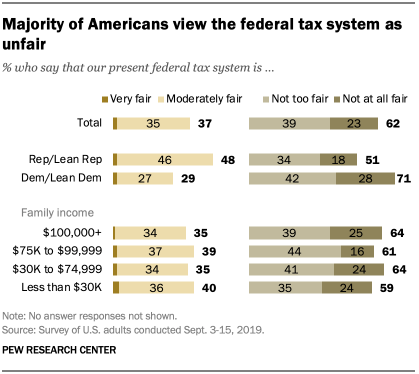
Most Americans have doubts about the fairness of the federal tax system. About six-in-ten (62%) describe the current tax system as either not too fair (39%) or not at all fair (23%). About a third describe the system as moderately fair (35%) and just 2% say it is very fair.
Overall views of the tax system are similar across levels of family income. There are much larger differences by party: Democrats are broadly critical of the fairness of the tax system, while Republicans hold more mixed views. About half of Republicans and Republican-leaning independents (48%) say the tax system is either moderately or very fair, while about as many (51%) say it is not too fair or not at all fair. By contrast, 71% of Democrats and Democratic leaners describe the federal tax system as not too fair or not at all fair; just 29% of Democrats say the system is at least moderately fair.
When asked to consider their own tax burden, 51% of adults say they pay more than their fair share in taxes, considering what they get from the federal government. Fewer adults (40%) say they pay about the right amount; just 8% say they pay less than their fair share in taxes.
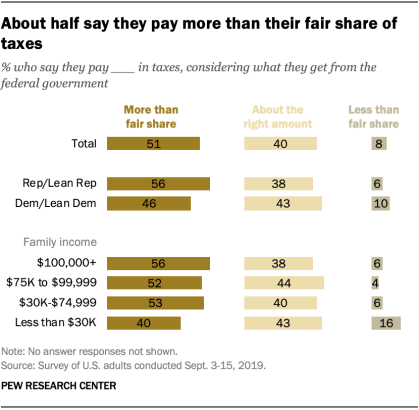
While Republicans have more positive views of the federal tax system than Democrats, they are more critical of their own tax burden. A majority of Republicans (56%) say they pay more than their fair share in taxes, compared with 38% who say they pay about the right amount. Democrats are more evenly divided: 46% say they pay more than their fair share, while 43% say they pay about the right amount.
Adults with family incomes below $30,000 a year are less critical of their own tax burden than those with higher incomes. Among those with incomes of less than $30,000 a year, 40% say they pay more than their fair share; about half or more in higher income categories say the same.
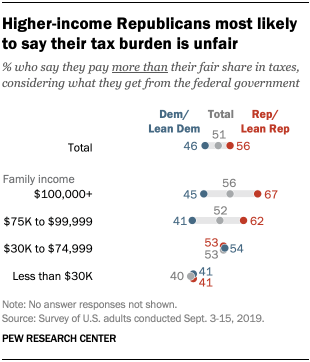
Higher-income Republicans are much more likely than lower-income Republicans to say they pay more than their fair share in taxes, considering what they get from the federal government. There are smaller differences in views among Democrats across income levels.
As a result, partisan differences in views of personal tax burdens are much larger among higher earners than lower earners. For instance, 67% of Republicans with family incomes of at least $100,000 a year say they pay more than their fair share in taxes, compared with fewer than half of Democrats (45%) in the same income range. This pattern is also seen among those with incomes of $75,000 to $99,999 a year.
By contrast, there is no partisan gap among those earning less than $75,000 a year. Similarly, 41% of both Republicans and Democrats with family incomes of less than $30,000 a year say they pay more than their fair share in taxes.
Views of tax rates for high earners and corporations
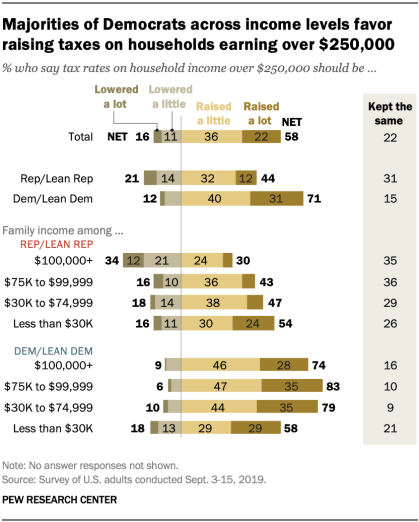
Overall, 58% of the public says that tax rates on household income of more than $250,000 should be raised either a lot (22%) or a little (36%). About two-in-ten (22%) think tax rates on income over $250,000 should be kept the same as they are now, while just 16% think rates should be lowered either a lot or a little.
Democrats are more likely than Republicans to favor raising tax rates on household income over $250,000. Seven-in-ten Democrats and Democratic leaners (71%) say these rates should be raised, including 31% who say they should be raised by a lot.
Views among Republicans and Republican leaners are more mixed: 44% say taxes on income over $250,000 per year should be increased, while 31% say they should be kept the same and 21% say they should be lowered.
Republicans with family incomes of at least $100,000 a year are about as likely to say tax rates on household income over $250,000 should be lowered (34%) as raised (30%). Among Republicans with lower family incomes, by contrast, there is more support for raising than lowering tax rates on high incomes. For instance, 54% of Republicans with family incomes of less than $30,000 think tax rates on household income over $250,000 should be raised, while just 16% think these rates should be lowered.
Majorities of Democrats at all income levels favor an increase in tax rates for household income above $250,000, though Democrats with incomes of less than $30,000 show somewhat less support for this policy (58% say these tax rates should be raised) than those with higher incomes (more than 70% say they should be raised).
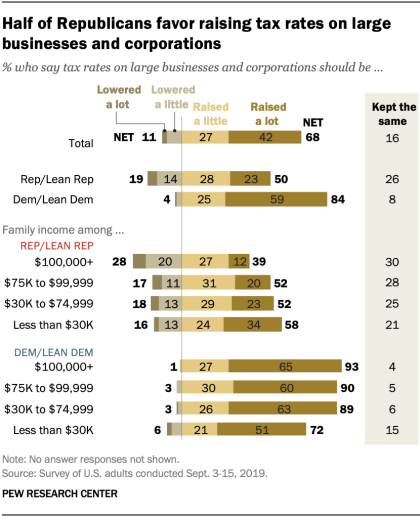
The public also broadly supports raising taxes on large businesses and corporations. About two-thirds (68%) say tax rates on large businesses and corporations should be increased either a lot (42%) or a little (27%). Relatively few think corporate taxes should be lowered (11%); 16% say they should be kept the same as they are now.
A wide majority of Democrats (84%) say corporate taxes should be raised either a lot (59%) or a little (25%). Most Democrats across income levels hold this view, though those with the lowest family incomes (less than $30,000) are somewhat less supportive of this than those with higher incomes.
Republicans are divided: 50% support higher taxes on businesses and corporations, while 26% favor rates staying the same and 19% say they should be lowered.
Among Republicans, those with the highest family incomes are the least supportive of raising corporate taxes: 39% of those with incomes of $100,000 a year or more support increasing taxes for large businesses and corporations, compared with about half or more of those with lower incomes.
Public sees decline in unions as bad for the country
Over the past several decades, there has been a large reduction in the percentage of workers who are represented by unions. A majority of Americans (57%) say this change has been bad for the country, while about four-in-ten (41%) say it has been good.
Partisans strongly disagree over whether the decline of organized labor has been good or bad. About six-in-ten Republicans and Republican-leaning independents (61%) say this change has been good for the country. By contrast, almost three-quarters of Democrats and Democratic leaners (74%) say the change has been bad. This divide is consistent with other recent Pew Research Center surveys showing that Democrats are much more likely to view labor unions positively than Republicans.
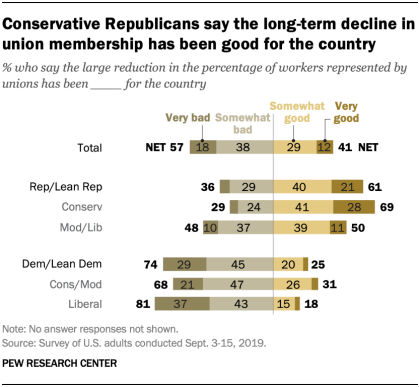
Ideological divides in views of organized labor exist within both parties. Among Republicans, 69% of conservatives say that the reduction in union representation has been good for the country. Moderate and liberal Republicans are more evenly divided: 50% say the decline has been good for the country, while 48% say it has been bad for the country.
Among Democrats, a large majority of liberals (81%) say the reduction in the share of workers represented by unions has been bad for the country; a somewhat smaller majority of conservative and moderate Democrats (68%) says the same.
In general, Republicans who are older, are wealthier and have higher levels of education are more likely to say that the decline in union representation has been good for the country than Republicans who are younger, less wealthy and have less education.
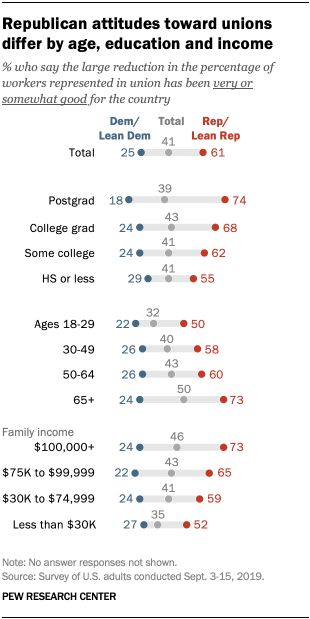
Nearly three-quarters of Republicans and Republican leaners ages 65 and older (73%) say the decline in organized labor has been good for the country. Smaller shares of Republicans ages 50 to 64 (60%), 30 to 49 (58%) and 18 to 29 (50%) hold this view.
The share of Republicans who say the reduction in union membership has been good for the country increases with income and educational attainment. A narrow majority of Republicans who have a high school diploma or less education (55%) say the decline in unions has benefited the country. Larger majorities of those with more education say the same. Similarly, Republicans with family incomes of $100,000 (73%) are more likely than those with incomes of less than $30,000 (52%) to view the decline of unions positively.
Democrats’ views about labor unions vary only slightly across age groups and levels of education and income. Majorities of all groups say the decline in unions has been bad for the country.
Views of stricter environmental laws, climate change
On environmental issues, 65% of adults say that stricter environmental laws and regulations are worth the cost, compared with 33% who say they cost too many jobs and hurt the economy.
A large majority of Democrats and Democratic leaners (85%) say stricter environmental laws are worth the cost, including 92% of liberal Democrats and 79% of conservative and moderate Democrats.
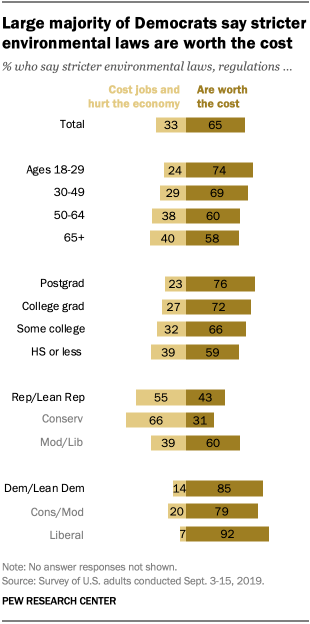
Republicans and Republican leaners are more likely to say stricter environmental laws cost jobs and hurt the economy (55%) than that they are worth the cost (43%). However, there is a wide divide in views among Republicans by ideology. Two-thirds of conservative Republicans (who make up about two-thirds of Republicans and Republican leaners) say stricter environmental laws hurt the economy. Views among moderate and liberal Republicans are nearly the reverse: 60% say stricter environmental laws are worth the cost.
Majorities across age groups and levels of educational attainment say stricter environmental laws are worth the cost. Adults younger than 30 (74%) and those with a postgraduate degree (76%) are among the most likely to say this.
As other surveys have found, there also continue to be wide partisan differences in opinions about climate change. Among the public overall, 52% say the Earth is getting warmer mostly because of human activity, while 17% say it is getting warmer mostly due to natural patterns in the environment. About two-in-ten (21%) say there is no solid evidence that the Earth is getting warmer, and 9% say they are not sure.
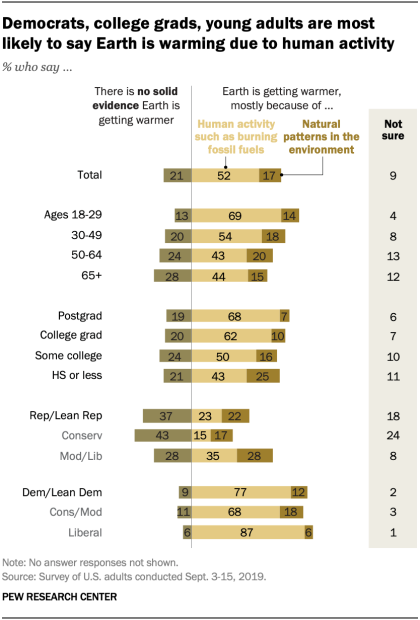
More than three-quarters of Democrats (77%) say the Earth is getting warmer mostly because of human activity, including 87% of liberals and 68% of conservatives and moderates.
Republicans are divided in their views. Overall, 45% think the Earth is getting warmer, but this group is split between those who think this is due mostly to human activity (23% of all Republicans) and those who say it is mostly because of natural patterns (22%).
About four-in-ten Republicans (37%) say there is no solid evidence that the Earth is getting warmer, while 18% say they are not sure. This is much higher than the 2% of Democrats who express uncertainty about this.
Conservative Republicans (43%) are more likely than moderate and liberal Republicans (28%) to say there is no solid evidence the Earth is getting warmer.
Among the public, majorities of those with a four-year college degree or more education and those under the age of 50 say the Earth’s temperature is getting warmer because of human activity. Smaller shares of older adults and those with lower levels of education hold this view.
Majority of Americans say government has responsibility to ensure health coverage
A majority of the public (59%) says that the federal government has a responsibility to make sure that all Americans have health care coverage, while 41% say this is not the government’s responsibility.
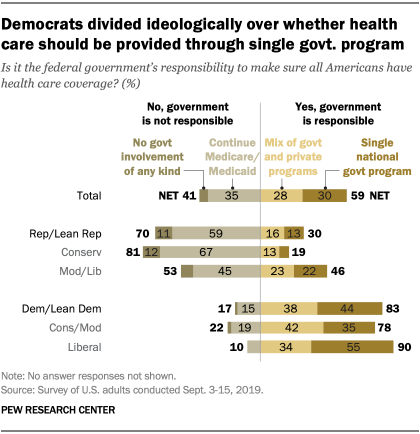
However, most of those who say the government does not have a responsibility to provide health coverage nonetheless favor continuing programs like Medicare and Medicaid. Roughly a third of the public (35%) holds this view. Just 6% say the government should not be involved in providing health insurance at all.
Among those who say it is the government’s responsibility to make sure all Americans have health care coverage, there are differences over how to achieve this goal.
Overall, 30% of adults say government is responsible for ensuring that all Americans have health care coverage and that health insurance should be provided through a single national health insurance system run by the government. A similar share of the public (28%) thinks health care for all Americans is a government responsibility but supports providing health insurance through a mix of private companies and government programs.
Seven-in-ten Republicans and Republican leaners say it is not the government’s responsibility to make sure all Americans have health insurance. Among Republicans, conservatives (81%) are much more likely than moderates and liberals (53%) to take this view. Still, just 12% of conservative Republicans say the government should not be involved in health care at all.
Among Democrats and Democratic leaners, 83% say it is the government’s responsibility to ensure that all Americans have health care coverage, including 90% of liberals and 78% of conservatives and moderates.
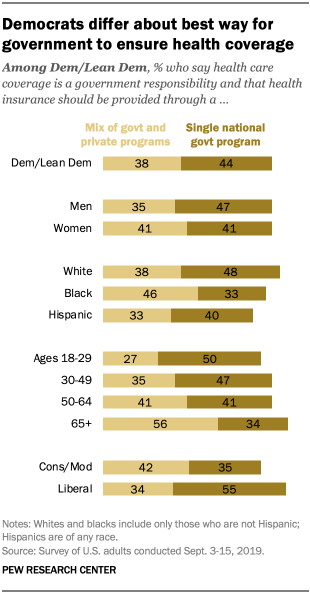
While a large majority of Democrats believe that the federal government has a responsibility to guarantee access to health insurance, Democrats are divided over how government should meet this aim.
Among Democrats, 44% prefer that health insurance be provided through a single national system run by the government, while 38% prefer a mix of private insurance companies and government programs.
A majority of Democrats ages 65 and older (56%) prefer a mix of government and private insurance, compared with only 27% of those ages 18 to 29. Half of this younger group (50%) says there should be a single national government program. White Democrats (48%) are somewhat more likely to prefer a single government program than black (33%) or Hispanic (40%) Democrats.
There also is a clear ideological divide on this question among Democrats. A majority of liberal Democrats (55%) prefer a single national health insurance program run by the government, compared with 34% who prefer a mix of private and government programs.
Conservative and moderate Democrats are more evenly divided, with 35% favoring a single national program and 42% favoring a mix of programs.
Ideological differences within GOP on gun policy
Six-in-ten Americans say that gun laws should be more strict than they are today, while just 11% say gun laws should be less strict; 28% say current gun laws are about right.
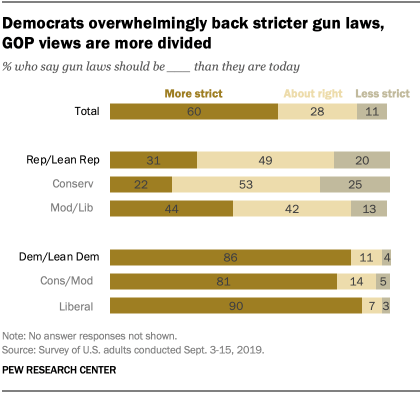
Democrats and Democratic leaners overwhelmingly support stricter gun laws, with 86% saying this. By comparison, Republicans are more divided. About half of Republicans and Republican leaners (49%) say that current gun laws are about right. Three-in-ten Republicans say that gun laws should be more strict, and two-in-ten say they should be less strict.
About half of conservative Republicans say gun laws today are about right, while 22% say they should be more strict and a similar share (25%) say they should be less strict. By comparison, 44% of moderate and liberal Republicans (who make up about one-third of Republicans and Republican leaners) say that gun laws should be stricter, while roughly as many say they are about right (42%); 13% say they should be less strict. There are only modest ideological differences among Democrats on this issue, with 81% of conservative and moderate Democrats and 90% of liberal Democrats saying gun laws should be stricter than they are today.
(For more on views about gun policy, see the October 2019 post “Share of Americans who favor stricter gun laws has increased since 2017.” )
Long-term opinion trends about stricter environmental regulation
In recent years, Pew Research Center has transitioned from probability-based telephone surveys to the American Trends Panel, a probability-based online panel. The transition from phone surveys conducted with an interviewer to online self-administered surveys brings with it the possibility of mode differences – differences arising from the method of interviewing.
This section includes a question about whether stricter environmental laws and regulations “cost too many jobs and hurt the economy” or “are worth the cost.” This question has been asked on the Center’s telephone surveys beginning in 1994 and was included both on a survey conducted in September on the American Trends Panel (ATP), on which this report is largely based, and a contemporaneous telephone survey.
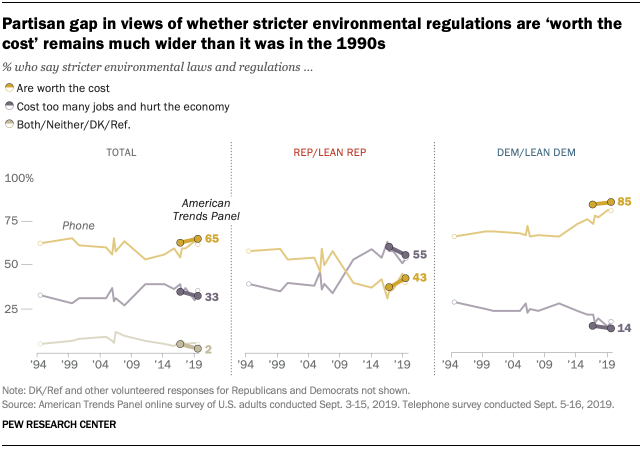
In the online survey, 65% say stricter environmental regulations are worth the cost, while 33% say they cost too many jobs and hurt the economy. Views in the phone survey are similar (61% vs. 35%).
The wide partisan gap on this question is also roughly the same online (42 percentage point gap in the share saying stricter regulations are worth the cost) as they are in the phone survey (40-point gap).
The telephone trend shows that although the partisan divide on these views is little changed over the past five years, it has grown substantially since the question was first asked in 1994. Throughout most of the 1990s and 2000s, Republicans and Republican leaners were more likely to say regulations were worth the cost than to say they cost too many jobs and hurt the economy, but since 2011 the balance of opinion within the GOP coalition has shifted. At the same time, the trend of opinion among Democrats and Democratic leaners has moved in the opposite direction: While the view that stricter environmental regulations are worth the cost has consistently been held by a majority of Democrats, the size of that majority has grown.




